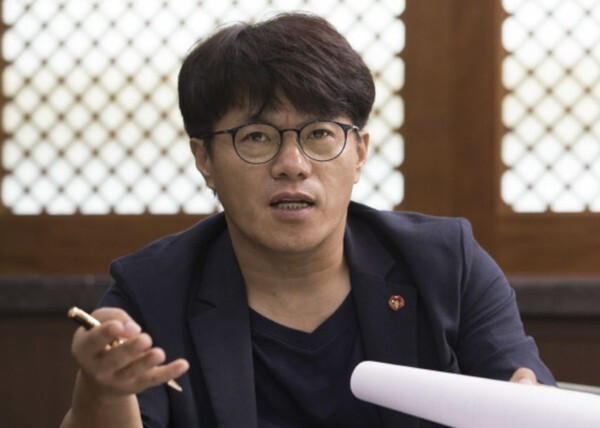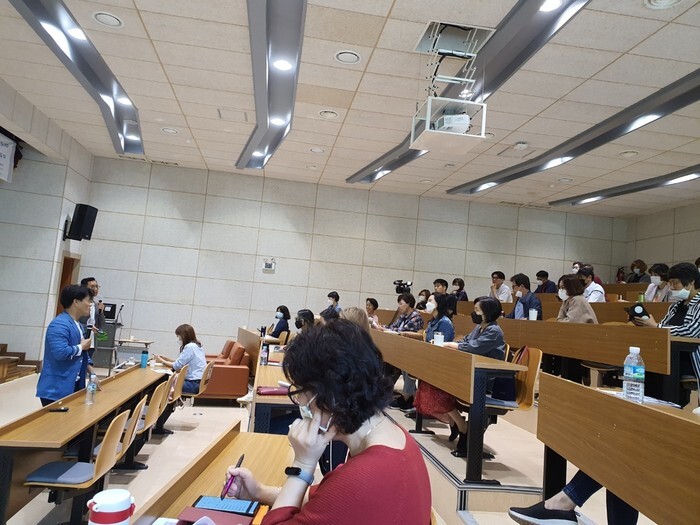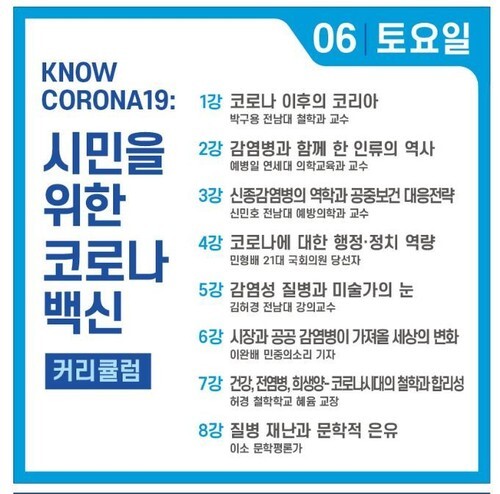hankyoreh
Links to other country sites 다른 나라 사이트 링크
[Interview] The path S. Korea should take in the post-coronavirus era

“What direction does South Korea need to travel in the post-coronavirus era?”
Speaking in a Free University of Gwangju lecture at the Gwangju Education Training Institute on May 30, Park Goo-yong, a professor of philosophy at Chonnam National University, started by posing a question to the audience: “Is the novel coronavirus pandemic a war or a state of emergency?” US President Donald Trump has regarded the battle with the virus as a “war.” But Park warned that “the ‘pandemic is war’ frame has the potential to undermine citizen sovereignty.”
“Wars can easily be used to justify too much government sovereignty and too little citizen sovereignty,” he said.
Park characterized the pandemic as a state of emergency. Historian Yuval Noah Harari has noted how short-term measures adopted during states of emergency can shape the world for a long time afterward. Park asked the question, “Are we to overcome the coronavirus state of emergency through the totalitarian monitoring of administrative authorities, or are we to overcome it by harmonizing and balancing citizen sovereignty, parliamentary sovereignty, and administrative sovereignty?” Warning of “the excessive surveillance mechanisms of administrative authorities,” Park cited the example of the panopticon, a circular prison concept designed by the utilitarian philosopher Jeremy Bentham for the monitoring of prisoners. The solution to the state of emergency set in motion by the virus will need to be sought through the lessons that the virus itself has taught us, he argued.
“The standards for the future that the virus has presented us with are openness, fairness, and public service,” he explained.
“The quality of future democracy will be determined by how rulers behave when the Constitution has been fully suspended, as with the events of the Gwangju Democratization Movement of May 1980,” he added.
Park quoted the words of Carl Schmitt, who said that the sovereignty operating in a state of emergency determines the role of citizen sovereignty under ordinary circumstances.

“Healthy behavior on the part of those in power is essential,” Park stressed.
Park pointed to neoliberalism as the chief culprit behind the pandemic, explaining that it had “intensified destruction of the natural environment by humans, destruction of humans by nature, destruction of society by the state, and individuals’ destruction of each other.”
“It’s important that we ‘regain the humanity to listen to the cries of nature’ [Max Horkheimer] and establish harmony and balance among the individual, society, and state,” he emphasized.
He went on to describe the current situation as one of “zombie capitalism,” where “neoliberal capitalism has collapsed and no new ideologies have emerged, leaving dead ideologies to wander about.”
“The coronavirus has left the world in an interregnum situation where there is no new zeitgeist,” he concluded.
As reasons for South Korea’s rise since the pandemic’s emergence, Park noted that it is a “country where citizens can enjoy medical technology and biotechnology as part of our lives despite our not having the world’s top science and technology capabilities” and a “top consumption and IT-usage nation despite not having the world’s top economic and administrative capabilities,” while also mentioning the harmony and balance that exist among its labor movement and campaigns at the citizen and community level.
“The coronavirus has given South Korea the opportunity to say goodbye to its past as a country of real estate speculation, a country of uncertain markets, a country of overwork, an insular nationalistic country,” he suggested.
“We need to proceed toward becoming a country that protects every one of its citizens and practices international solidarity,” he urged.

As an alternative approach for the post-coronavirus era, Park suggested “establishing a new balance between nature and humankind.”
“The important thing is harmony and balance among citizen sovereignty, parliamentary sovereignty, and administrative sovereignty,” he stressed.
“Capable groups and other ‘spokespeople for nature’ will need to be able to take part in all legislation and policy formulation processes, and we will need to enable to creation of different forms of society -- including social activities, recreation, and research -- so that the worlds in which citizen lives are not ‘colonized by state administrations and capital markets’ [Jurgen Habermas],” Park said.
He also stressed the need for “more active politics so that the National Assembly is not handing the government carte blanche with the legislative authorities entrusted to it by the people,” as well as “more active discourse between citizens and political parties.”
By Jung Dae-ha, Gwangju correspondent
Please direct comments or questions to [english@hani.co.kr]

Editorial・opinion
![[Column] Season 2 of special prosecutor probe may be coming to Korea soon [Column] Season 2 of special prosecutor probe may be coming to Korea soon](https://flexible.img.hani.co.kr/flexible/normal/500/300/imgdb/original/2024/0426/3317141030699447.jpg) [Column] Season 2 of special prosecutor probe may be coming to Korea soon
[Column] Season 2 of special prosecutor probe may be coming to Korea soon![[Column] Park Geun-hye déjà vu in Yoon Suk-yeol [Column] Park Geun-hye déjà vu in Yoon Suk-yeol](https://flexible.img.hani.co.kr/flexible/normal/500/300/imgdb/original/2024/0424/651713945113788.jpg) [Column] Park Geun-hye déjà vu in Yoon Suk-yeol
[Column] Park Geun-hye déjà vu in Yoon Suk-yeol- [Editorial] New weight of N. Korea’s nuclear threats makes dialogue all the more urgent
- [Guest essay] The real reason Korea’s new right wants to dub Rhee a founding father
- [Column] ‘Choson’: Is it time we start referring to N. Korea in its own terms?
- [Editorial] Japan’s rewriting of history with Korea has gone too far
- [Column] The president’s questionable capacity for dialogue
- [Column] Are chaebol firms just pizza pies for families to divvy up as they please?
- [Column] Has Korea, too, crossed the Rubicon on China?
- [Correspondent’s column] In Japan’s alliance with US, echoes of its past alliances with UK
Most viewed articles
- 1AI is catching up with humans at a ‘shocking’ rate
- 2Korea’s 1.3% growth in Q1 signals ‘textbook’ return to growth, says government
- 3Is Japan about to snatch control of Line messenger from Korea’s Naver?
- 4After election rout, Yoon’s left with 3 choices for dealing with the opposition
- 5No good, very bad game for Korea puts it out of Olympics for first time since 1988
- 6Will NewJeans end up collateral damage in internal feud at K-pop juggernaut Hybe?
- 7[Column] Season 2 of special prosecutor probe may be coming to Korea soon
- 81 in 5 unwed Korean women want child-free life, study shows
- 9[Column] Park Geun-hye déjà vu in Yoon Suk-yeol
- 10‘We must say no’: Seoul defense chief on Korean, USFK involvement in hypothetical Taiwan crisis